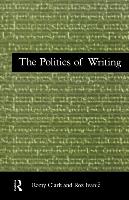Writing matters: it plays a key role in the circulation of ideas in society and has a direct impact on the development of democracy. But only a few get to do the kind of writing that most influence this development.
The Politics of Writing examines writing as a social practice. The authors draw on critical linguistics, cultural studies and literacy studies, as they explore and analyse:
* the social context in which writing is embedded
* the processes and practices of writing
* the purposes of writing
* the reader-writer relationship
* issues of writer identity.
They challenge current notions of 'correctness' and argue for a more democratic pedagogy as part of the answer to the inequitable distribution of the right to write.

